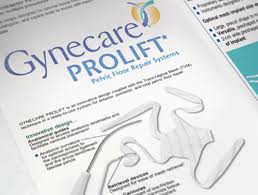Have you suffered from serious side effects of the Gynecare Prolift vaginal mesh device after surgery to repair Pelvic Organ Prolapse (POP) or Stress Urinary Incontinence (SUI)? If so, you are not alone. Thousands of women have been seriously injured by transvaginal mesh — injuries include serious infection, organ perforation, chronic pain during intercourse, vaginal scarring, and more.
What You Can Do & How a Gynecare Prolift Lawsuit Can Help
The Schmidt Firm, PLLC is currently accepting Gynecare Prolift induced injury cases in all 50 states. If you or somebody you know has been injured by Gynecare Prolift vaginal mesh, you should contact our lawyers immediately for a free case consultation. Please use the form below to contact our Defective Medical Device Litigation Group or call us toll-free 24 hours a day at (866) 920-0753.
Overview
Johnson & Johnson’s Gynecare Prolift Transvaginal Pelvic Floor Repair System is a sling-like mesh that is surgically placed into the pelvis through small incisions in the vagina. It is used to treat Pelvic Organ Prolapse (POP), a condition in which organs protrude into the vagina due to a weakened vaginal wall. It can also treat Stress Urinary Incontinence (SUI), a condition in which weakened pelvic muscles allow the urethra to open when a woman coughs, sneezes, or laughs. POP and SUI are common complications after pregnancy. In 2011, approximately 300,000 women had vaginal mesh surgery to treat these conditions.
In June 2012, Johnson & Johnson announced that they will be voluntarily withdrawing all four of its transvaginal mesh devices, including the Gynecare Prolift. This is not a recall, but simply an announcement that Gynecare Prolift will no longer be sold in the United States.
Gynecare Prolift and the FDA
The FDA warned Johnson & Johnson to stop marketing the Gynecare Prolift in August 2007, after the agency became aware that the product was being sold without FDA clearance. Despite the warning, J&J continued to sell Gynecare Prolift for nine months while engaged in talks with the FDA. J&J faced no sanctions for failing to gain FDA approval or continuing to sell Gynecare Prolift after the FDA ordered a halt.
J&J began selling Gynecare Prolift in 2005 without applying for FDA clearance. The company claimed that the device was “substantially similar” to other vaginal mesh devices that had already been approved by the FDA. Under the FDA’s 510(k) process, “similar” products do not need to conduct well-controlled safety studies before they are approved.
The FDA initially warned about the risk of Gynecare Prolift side effects in 2008, after receiving more than 1,000 reports of women who had been injured by organ perforation, device erosion into the vaginal wall, and other complications. In July 2011, after receiving nearly 3,000 additional reports of complications, the FDA issued another safety warning that complications were “not rare.”
Gynecare Prolift Side Effects
Side effects of the Gynecare Prolift vaginal mesh may include:
- Infection, which can be life-threatening, cause disfigurement, or nerve damage
- Erosion of the mesh into the vaginal wall
- Pain, which can interfere with sexual intercourse
- Perforation of internal organs (bowel, bladder, or blood vessels), which may occur during placement of the device
- Vaginal bleeding
- Scarring
- Nerve damage
- Urinary problems
- Return of Pelvic Organ Prolapse (POP) or Stress Urinary Incontinence (SUI)
- Shortening, hardening, or disfigurement of the vagina
- Psychological damage
When these side effects occur, most women must have an additional surgery to repair, replace, or remove their defective vaginal mesh. However, doctors cannot completely cure all types of vaginal mesh complications — severe scarring or nerve damage, for example, could permanently inhibit a woman’s ability to have sexual intercourse without pain. This could severely damage her quality of life.
Gynecare Prolift Lawsuit
If you were injured by the Gynecare Prolift, you may have a Gynecare Prolift lawsuit and be entitled to significant financial compensation for your pain and suffering, past and future medical expenses, lost income, decreased quality of life, and more.
More than one thousand women have filed vaginal mesh lawsuits. The litigation is currently split into four separate Multidistrict Litigations (MDLs) against four different manufacturers of these devices. In an MDL, each case remains independent, but they are centralized in one court to improve efficiency and reduce the risk of conflicting rulings in multiple courts.
You may still have time to file a Gynecare Prolift lawsuit. Contact The Schmidt Firm, PLLC immediately for more information.
Do I have a Gynecare Prolift Lawsuit?
The Schmidt Firm, PLLC is currently accepting Gynecare Prolift induced injury cases in all 50 states. If you or somebody you know has been injured by Gynecare Prolift vaginal mesh, you should contact our lawyers immediately for a free case consultation. Please use the form below to contact our Defective Medical Device Litigation Group or call toll free 24 hours a day at (866) 920-0753.
Attention Lawyers: We consider a referral from another law firm to be one of the greatest compliments. If your firm is interested in referring us a case or for us to send you a list of previous award judgments and/or average referral fees, please visit the Lawyer Referral section of our website.


 The Schmidt Firm, PLLC has been recognized as one of the nation’s leading plaintiffs' law firms and handles cases in all 50 states. We are very proud of our legal achievements, but equally self-respecting of our firm's reputation for providing personal attention to each and every client we represent.
The Schmidt Firm, PLLC has been recognized as one of the nation’s leading plaintiffs' law firms and handles cases in all 50 states. We are very proud of our legal achievements, but equally self-respecting of our firm's reputation for providing personal attention to each and every client we represent.

